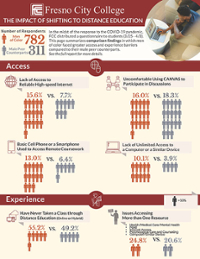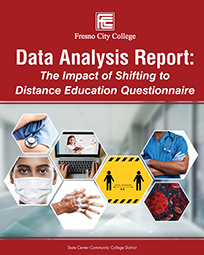The following institutional effectiveness reports and surveys provide in-depth information, studies, and research about the college as related to student success, student equity, human resources, economic impact, and programs.
Enrollment Pain Point Audit by EAB
EAB Global, Inc. provides school management and administration consultancy services. The Enrollment Pain Point Audit report prepared by EAB, breaks the enrollment process into eight such categories. The layout of this report is specifically designed to highlight areas of strength and weakness identified throughout the auditing process. Each section of the report (e.g., Welcome and Campus Navigation, Application, and Admissions) corresponds to one of the onboarding steps necessary to enroll at Fresno City College.
Analysis of the Economic Impact and Return on Investment of Education (by EMSI, 2018) report investigates the economic impacts created by FCC on the business community and the benefits that the college generates in return for the investments made by its key stakeholder groups—students, taxpayers, and society. The college’s service region consists of Fresno, Kings, Madera, and Tulare Counties. All results reflect student and financial data for fiscal year (FY) 2016-17. Impacts on the regional business community are reported under the economic impact analysis. Results are measured in terms of added income. The returns on investment to students, taxpayers, and society are reported under the investment analysis. (Results pending)
Fresno City College Economic Overview and Program Demand Gap Analysis (by EMSI, 2018)report provides results across all of FCC’s certificate, associate degree, associate degree for transfer, and non-credit program levels. The analysis connects the college’s program completers with the availability of regional job openings. For FCC’s non-credit courses, the analysis is similar in that is connects the college’s completers with the availability of regional jobs, regardless of the industry or program, but without the additional reference to non-credit program completers from other post-secondary educational institutions in the FCC Service Region. Furthermore, the analysis focuses on the gaps and surpluses in the programs by award level.
The President’s Human Resources Prioritization and Recommendations Report includes recommendations that were informed by campus-wide governance processes and is an effort to effectively plan for identified needs, as well as illuminate the process and rationale for decision making in a complex environment. The purpose of this report is to assist the College and District in efforts to intentionally use data to plan for future growth as well as effectively meet the current student and employer demands for academic and workforce education. Additionally, the report aids the College in the systematic prioritization of staffing needs over the coming years as the college explores reorganization through a Guided Pathways framework and begins expansion to additional locations. This report will assist the District in fulfilling its mission to “promote exemplary educational opportunities and to provide safe, inclusive, and supportive learning environments leading to student success and global competitiveness which will transform our region.” Furthermore, the report is designed to provide the information and data to support and inform college stakeholders on the prioritization process as well as make recommendations for additional procedures and metrics that could be utilized in future staffing considerations.
Report on the Review of the Organizational Structure of Fresno City College With Special Emphasis, on Instruction and Student Services (by PPL Consulting Team, Brice W. Harris, et.al.)
Student Equity Plan:
2023-2025 Student Equity Plan Executive Summary
Qualitative Research:
The following qualitative research study was conducted as a result of goals identified in the Fresno City College 2022 Student Equity Plan.
- Navigating the Transfer Journey: Insights from Fresno City College Students
- Navigating the Transfer Journey: Advice for Students by Students
The following qualitative research studies were conducted as a result of goals identified in the Fresno City College 2014 Student Equity Plan.
- Factors That Affect African American Student Academic Success at FCC
- Factors That Affect Latina/o Student Academic Success at FCC
- Factors That Affect Native American Student Academic Success at FCC
- Factors That Affect South East Asian Student Academic Success at FCC
- Factors That Affect LGBTQ Student Academic Success at FCC
The Community College Equity Assessment Lab (CCEAL) Reports:
- Community College Success Measure (CCSM) is a survey designed by the CCEAL as a comprehensive tool for evaluating student success in community colleges with a focus on students who have been historically underserved in postsecondary education. The CCSM was developed to examine predictors of community college student success. The CCSM’s items and scales are specifically designed to measure experiences and factors directly impacting the success of community college students of color. These factors include non-cognitive outcomes (e.g. locus of control, utility, academic self-efficacy), environmental factors (e.g. finances, family responsibilities), campus ethos (e.g. campus climate, perceptions of care), and identity (e.g. gender and race/ethnicity).
- Community College – Instructional Development Inventory (CC-IDI) is an institutional assessment tool designed to inform professional development programming for instructional faculty. The report has two components, threshold scores based on self-reported practice and faculty members' recommendations for areas of professional development focus.
- Community College – Staff Development Inventory (CC-SDI) is an institutional assessment tool designed to inform professional development programming for student services personnel who support community college students. The report has two components, threshold scores based on self-reported practice and staff members' recommendations for areas of professional development focus.
With the onset of the COVID-19 pandemic (Coronavirus Disease 2019) and the unanticipated transition to moving Fresno City College (FCC) courses fully online, many people have been affected by the abrupt shift to distance education (DE) and learning while sheltering in place. During the college’s “humanitarian week,” the week before DE instruction began, under the direction of the Vice President of Educational Services, the IRAP team, in collaboration with the Director of Distance Education, Academic Senate President, and Director of Student Equity and Success developed a student questionnaire to understand the impact of shifting course sections to a remote environment.
The purpose of this report is to describe the impact on student success created by the campus COVID-19 response to immediately move instruction to a remote environment. The campus wanted to learn from students’ the barriers they face to access their courses and services needed to support their success in a remote environment. From an equity-minded perspective, the challenges are particularly prevalent for minoritized students. Thus this report focuses on understanding the challenges faced by racially minoritized students compared to their peer counterparts.
The executive summary of the questionnaire consists of data visualizations. The first two pages include comparison findings as reflected in the data analysis report, men of color and their male peer counterparts and for the women of color and their female counterparts; the following two pages include disaggregated data of the key impact for men of color and their male peer counterparts and for the women of color and their female counterparts as disaggregated by ethnicity; the last two pages include aggregated data results for 3,703 students who participated in the questionnaire.
Executive Summary of Data Visuals
The Community College Survey of Student Engagement (CCSSE) and Survey of Entering Student Engagement (SENSE), products and services of the Center for Community College Student Engagement, are well-established tools that helps institutions focus on good educational practice and identify areas in which they can improve their programs and services for students. CCSE is administered during the spring to mostly returning students, CCSSE asks about institutional practices and student behaviors that are highly correlated with student learning and retention. SENSE helps community colleges discover why some entering students persist and succeed and others do not. Administered during the 4th and 5th weeks of the fall academic term, SENSE asks students to reflect on their earliest experiences (academic and services-related) with the college. The survey results are listed below as they become available.
CCSSE
- 2023
- 2017
- 2014
SENSE
- We are currently creating an ADA compliant document. Please contact the IRPE office (ir@fresnocitycollege.edu) to request a copy of the SENSE results.
To assess campus climate Fresno City College conducted an employee survey. The Noel-Levitz College Employee Satisfaction survey was used. This survey assesses how employees feel about key topics such as the campus culture, work environment, mission and more. With data from this survey, we can identify which issues are most important to FCC employees, assess their attitudes toward the institutional mission and goals, uncover key data about the work environment on campus, and learn the most effective ways to keep the employees satisfied and productive.
- Fall 2014








